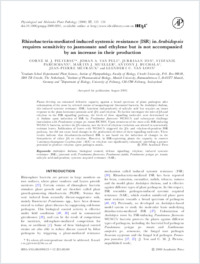Rhizobacteria-mediated induced systemic resistance (ISR) in Arabidopsis requires sensitivity to jasmonate and ethylene but is not accompanied by an increase in their production
- Pieterse, Corné M. J. Graduate School Experimental Plant Sciences, Section of Phytopathology, Faculty of Biology, Utrecht University, The Netherlands
- Pelt, Johan A. van Graduate School Experimental Plant Sciences, Section of Phytopathology, Faculty of Biology, Utrecht University, The Netherlands
- Ton, Jurriaan Graduate School Experimental Plant Sciences, Section of Phytopathology, Faculty of Biology, Utrecht University, The Netherlands
- Parchmann, Stefanie Institute of Pharmaceutical Biology, Munich University, Germany
- Mueller, Martin J. Institute of Pharmaceutical Biology, Munich University, Germany
- Buchala, Antony J. Department of Biology, University of Fribourg, Switzerland
- Métraux, Jean-Pierre Department of Biology, University of Fribourg, Switzerland
- Loon, Leendert C. van Graduate School Experimental Plant Sciences, Section of Phytopathology, Faculty of Biology, Utrecht University, The Netherlands
-
2000
Published in:
- Physiological and Molecular Plant Pathology. - 2000, vol. 57, no. 3, p. 123-134
English
Plants develop an enhanced defensive capacity against a broad spectrum of plant pathogens after colonization of the roots by selected strains of nonpathogenic biocontrol bacteria. In Arabidopsis thaliana, this induced systemic resistance (ISR) functions independently of salicylic acid but requires an intact response to the plant hormones jasmonic acid (JA) and ethylene. To further investigate the roles of JA and ethylene in the ISR signalling pathway, the levels of these signalling molecules were determined in A. thaliana upon induction of ISR by Pseudomonas fluorescens WCS417r and subsequent challenge inoculation with Pseudomonas syringae pv. tomato DC3000. Upon treatment of the roots with ISR-inducing WCS417r bacteria, neither the JA content, nor the level of ethylene evolution was altered in systemically resistant leaves. Infiltration of leaves with WCS417r triggered the JA- and ethylene-dependent ISR pathway, but did not cause local changes in the production of either of these signalling molecules. These results indicate that rhizobacteria-mediated ISR is not based on the induction of changes in the biosynthesis of either JA or ethylene. However, in ISR-expressing plants the capacity to convert 1-aminocyclopropane-1-carboxylate (ACC) to ethylene was significantly enhanced, providing a greater potential to produce ethylene upon pathogen attack.
- Faculty
- Faculté des sciences et de médecine
- Department
- Département de Biologie
- Language
-
- English
- Classification
- Biological sciences
- License
-
License undefined
- Identifiers
-
- RERO DOC 5488
- DOI 10.1006/pmpp.2000.0291
- Persistent URL
- https://folia.unifr.ch/unifr/documents/300130
Statistics
Document views: 195
File downloads:
- Texte intégral: 482
